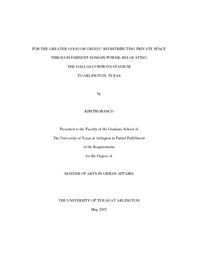
ATTENTION: The works hosted here are being migrated to a new repository that will consolidate resources, improve discoverability, and better show UTA's research impact on the global community. We will update authors as the migration progresses. Please see MavMatrix for more information.
Show simple item record
| dc.contributor.author | Probasco, Kim | en_US |
| dc.date.accessioned | 2007-08-23T01:56:51Z | |
| dc.date.available | 2007-08-23T01:56:51Z | |
| dc.date.issued | 2007-08-23T01:56:51Z | |
| dc.date.submitted | May 2007 | en_US |
| dc.identifier.other | DISS-1691 | en_US |
| dc.identifier.uri | http://hdl.handle.net/10106/493 | |
| dc.description.abstract | The use of eminent domain power to take private land for private use continues to grow in the United States. Many American people lost their homes or businesses to city and council driven economic development in low-income neighborhoods. This paper seeks to explore the social implications that eminent domain power has on residents and examines power that is used by cities and councils to create economic development through the taking of land in low-income communities. I explore these issues through a case study of the Dallas Cowboys Stadium relocation to Arlington, Texas utilizing discourse analysis. I use Henri Lefebvre's conceptual triad of representational space, representations of space, and spatial practices to understand the production of urban space through the use of eminent domain power. | en_US |
| dc.description.sponsorship | Hudson, Margaret | en_US |
| dc.language.iso | EN | en_US |
| dc.publisher | Urban & Public Affairs | en_US |
| dc.title | For The Greater Good Or Greed? Redistributing Private Space Through Eminent Domain Power: Relocating The Dallas Cowboys Stadium To Arlington, Texas | en_US |
| dc.type | M.A. | en_US |
| dc.contributor.committeeChair | Hudson, Margaret | en_US |
| dc.degree.department | Urban & Public Affairs | en_US |
| dc.degree.discipline | Urban & Public Affairs | en_US |
| dc.degree.grantor | University of Texas at Arlington | en_US |
| dc.degree.level | masters | en_US |
| dc.degree.name | M.A. | en_US |
Files in this item
- Name:
- umi-uta-1691.pdf
- Size:
- 984.6Kb
- Format:
- PDF
This item appears in the following Collection(s)
Show simple item record


